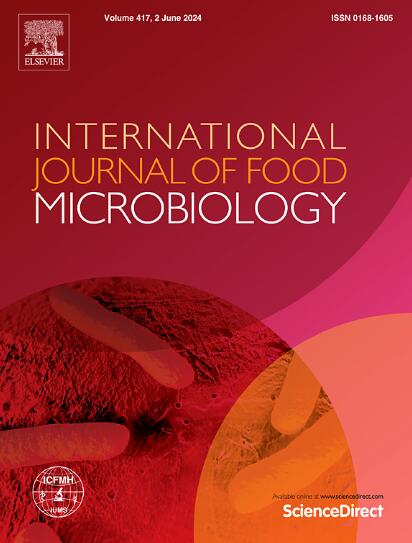Stress response variability can cause up to 3-fold increase in the thermal resistance of Salmonella strains
IF 5.2
1区 农林科学
Q1 FOOD SCIENCE & TECHNOLOGY
International journal of food microbiology
Pub Date : 2025-08-05
DOI:10.1016/j.ijfoodmicro.2025.111347
引用次数: 0
Abstract
The variability in the bacterial stress response has received plenty of attention during the last years, partly due to its relevance to microbial risk assessment. Although the microbial response is affected by numerous variability sources, previous studies focused mostly on strain variability (inherent differences between strains of the same bacterial species) under optimal growth conditions. Here, we analyze a variability source relatively unexplored within microbial risk assessment: stress response variability. This refers to physiological differences due to prior exposure to stressful environments. Namely, we studied the impact of sub-optimal pre-culture conditions or the application of an acid shock on the thermal resistance of two strains of Salmonella (a reference strain and a highly heat resistant one). We observed that stress response variability is strain dependent. The heat resistance of the reference strain had a significant increase in heat resistance (up to 3-fold increase), whereas the conditions tested resulted in a reduction of thermal resistance with respect to control conditions (up to 2-fold reduction). Considering that magnitude of these changes are comparable to strain variability, and that stress response variability might be common throughout the food supply chain, this study evidences the need to study this phenomenon further in order to incorporate it into quantitative microbial risk assessments.
应激反应的可变性可导致沙门氏菌菌株的耐热性增加3倍
在过去的几年里,细菌应激反应的可变性受到了广泛的关注,部分原因是它与微生物风险评估的相关性。虽然微生物反应受到多种变异性来源的影响,但以往的研究主要集中在最佳生长条件下的菌株变异性(同一细菌种类的菌株之间的固有差异)。在这里,我们分析了微生物风险评估中相对未开发的变异性来源:应激反应变异性。这是指由于先前暴露于压力环境而产生的生理差异。也就是说,我们研究了次优预培养条件或酸冲击对两株沙门氏菌(参考菌株和高度耐热菌株)耐热性的影响。我们观察到应力响应变异性是应变依赖的。参考应变的耐热性显著增加(最多增加3倍),而测试条件导致相对于控制条件的热阻降低(最多减少2倍)。考虑到这些变化的幅度与菌株变异性相当,并且应激反应变异性可能在整个食品供应链中很常见,本研究证明有必要进一步研究这一现象,以便将其纳入定量微生物风险评估。
本文章由计算机程序翻译,如有差异,请以英文原文为准。
求助全文
约1分钟内获得全文
求助全文
来源期刊
CiteScore
10.40
自引率
5.60%
发文量
322
审稿时长
65 days
期刊介绍:
The International Journal of Food Microbiology publishes papers dealing with all aspects of food microbiology. Articles must present information that is novel, has high impact and interest, and is of high scientific quality. They should provide scientific or technological advancement in the specific field of interest of the journal and enhance its strong international reputation. Preliminary or confirmatory results as well as contributions not strictly related to food microbiology will not be considered for publication.

 求助内容:
求助内容: 应助结果提醒方式:
应助结果提醒方式:


